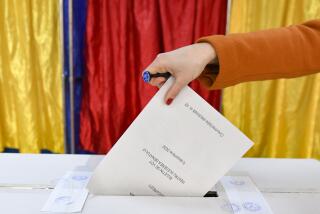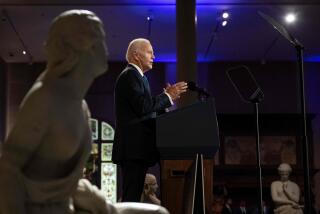Report on Iraq Finds Its People Hang On to Dwindling Hopes
- Share via
WASHINGTON — A report on Iraq being released today by a prominent think tank here concludes that Iraqis remain guardedly optimistic about their future despite continuing violence, but warns that they could lose hope without faster progress toward stability and economic growth.
The document, by the Center for Strategic and International Studies, recommends accelerated spending on reconstruction, funneling more aid through local governments directly to Iraqis, and backing the return of the United Nations and other international groups to prepare for January’s national elections. The U.N. appointed a new envoy to Iraq, but most of the mission’s staff is based outside the country for security reasons.
The report also calls for increasing the visibility of Iraqi units in security operations when possible, saying Iraqis have lost faith in U.S. and other international military forces struggling to impose order.
“With the possible exception of the Kurds, Iraqis generally dislike the continued presence of the U.S.-led military forces in their country,” concludes a summary of the independent think tank’s report, “Progress or Peril? Measuring Iraq’s Reconstruction.”
In many ways, the conclusions echo other independent assessments that have followed the hand-over of power from an American-led occupation authority to an interim Iraqi government. For example, some experts argued several months ago that more U.S. troops were needed to restore order in the country. Many of those now say they believe additional U.S. troops might add to the unrest rather than help quell it.
However, the extensive nature of the data involved in the CSIS study, gathered over a 13-month period from 16 different polls, about 400 private interviews, and nearly 80 public, official and media sources, gives it additional significance.
Iraqis “still retain a sense of optimism but are very frustrated that reconstruction isn’t happening faster,” said Bathsheba Crocker, co-director of the CSIS Post-Conflict Reconstruction Project and co-author of the report.
Last week, a senior Bush administration official estimated that less than $1 billion of the $18.4 billion approved in November by Congress for rebuilding Iraq had been spent.
Crocker predicted that the public support enjoyed by the fragile new Iraqi government institutions, including the security forces, could dissipate in a matter of months if they did not begin to deliver results. A loss of faith in those American-designed organizations could force Iraqis to place their loyalties elsewhere, possibly among insurgent groups or tribal or ethnic-based factions, she said.
In other issues, the report finds growing worry among Kurds about the accountability of their own political parties, along with a wariness about the ability of party leaders to protect Kurdish interests within a new national Iraqi government. Of all Iraq’s ethnic groups, the Kurds are widely cited as having the most stable political leaderships.
The report also presents evidence that initial progress in education from an intense school reconstruction program in the months after the end of major combat has been undercut by rising student dropout rates as children seek work to help contribute to sputtering family incomes.
More to Read
Sign up for Essential California
The most important California stories and recommendations in your inbox every morning.
You may occasionally receive promotional content from the Los Angeles Times.













